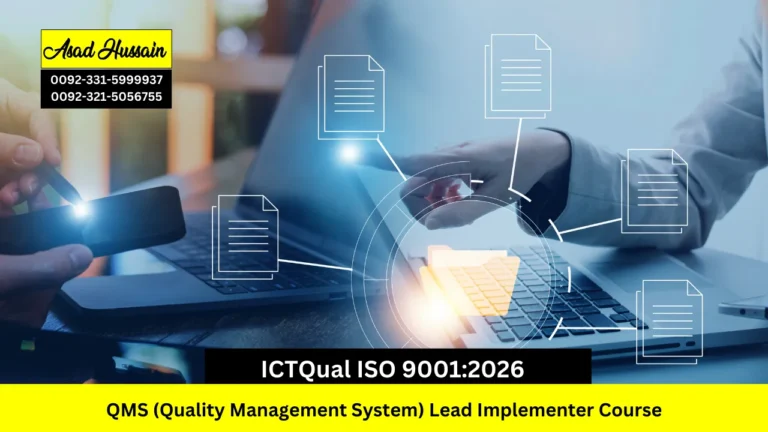In today’s fast-paced and technologically driven world, the field of mechanical engineering continues to offer numerous career opportunities. As industries evolve and demand for skilled professionals increases, pursuing an accredited qualification can make all the difference in securing a rewarding and stable career. One such qualification is the ICTQual Level 5 Diploma in Mechanical Engineering, which provides students with advanced knowledge and hands-on skills in mechanical engineering over the course of two years and a total of 240 credits.
The ICTQual Level 5 Diploma in Mechanical Engineering is a specialized qualification designed to equip students with the technical and theoretical expertise required to excel in mechanical engineering roles. This program is typically pursued after completing Level 3 or an equivalent qualification and is recognized for its comprehensive curriculum that integrates both theoretical understanding and practical application.
The ICTQual Level 5 Diploma in Mechanical Engineering (240 Credits – Two Years) is an excellent choice for individuals looking to deepen their technical expertise in the field of mechanical engineering. With a curriculum that balances theoretical learning with practical application, this diploma equips students with the skills and knowledge needed to thrive in the ever-evolving engineering industry. Whether you’re aiming to launch a career or looking to enhance your existing qualifications, this diploma provides a solid foundation for future success in mechanical engineering.
Program Highlights
Year 1 (120 Credits)
- Introduction to Mechanical Engineering
- Engineering Mathematics
- Physics for Engineers
- Engineering Materials
- Technical Drawing and CAD
- Thermodynamics
- Mechanics of Solids
- Fluid Mechanics
- Health and Safety in Engineering
- Introduction to Manufacturing Processes
- Electrical and Electronics Fundamentals for Engineers
- Communication and Professional Skills
Year 2 (120 Credits)
- Advanced Thermodynamics
- Mechanics of Machines
- Engineering Design and Analysis
- Computer-Aided Engineering (CAE)
- Automation and Control Systems
- Renewable Energy Systems
- Heat Transfer Applications
- Dynamics of Machinery
- Advanced Manufacturing Processes
- Robotics and Mechatronics
- Engineering Project Management
- Capstone Project in Mechanical Engineering
To enroll in the ICTQual Level 5 Diploma in Mechanical Engineering (240 Credits – 2 Years), candidates must meet the following entry requirements:
- A minimum of a Level 4 qualification (e.g., HNC, NVQ Level 4, or equivalent) in a related field such as engineering, mathematics, physics, or a science-based discipline. A strong understanding of mechanical engineering principles, mathematics, and physics is highly recommended, as the course builds upon these foundational concepts and delves into advanced mechanical engineering topics.
- A minimum age of 18 years to be eligible for enrollment in the program.
- Proficiency in English, as the course involves technical terminology, written assignments, and effective communication in mechanical engineering contexts.
- A solid grasp of mathematics and physics, as these subjects are crucial for advanced problem-solving, design, and analysis within mechanical engineering.
- While not required, prior experience or exposure to mechanical engineering work, technical projects, or related industries can provide valuable insight and enhance the learning experience throughout the course.
Below are the learning outcomes for each of the study units in the ICTQual Level 5 Diploma in Mechanical Engineering program:
Learning Outcomes for Year 1 (120 Credits)
- Introduction to Mechanical Engineering
- Recognize key concepts and applications in mechanical engineering.
- Identify industry roles and responsibilities of mechanical engineers.
- Engineering Mathematics
- Apply mathematical techniques to solve engineering problems.
- Use computational tools to analyze engineering equations.
- Physics for Engineers
- Understand fundamental principles of mechanics and energy transfer.
- Apply physics concepts to engineering scenarios.
- Engineering Materials
- Identify properties and applications of common engineering materials.
- Evaluate material selection based on performance criteria.
- Technical Drawing and CAD
- Create engineering drawings using CAD software.
- Interpret technical drawings for manufacturing and design purposes.
- Thermodynamics
- Understand basic principles of thermodynamics and energy systems.
- Analyze thermodynamic processes in mechanical systems.
- Mechanics of Solids
- Calculate stress, strain, and deformation in solid materials.
- Assess material behavior under various loading conditions.
- Fluid Mechanics
- Analyze fluid behavior in engineering applications.
- Solve basic fluid flow problems using governing equations.
- Health and Safety in Engineering
- Recognize workplace hazards and implement safety procedures.
- Apply engineering controls to ensure a safe working environment.
- Introduction to Manufacturing Processes
- Explain key manufacturing processes used in engineering.
- Select appropriate processes for specific engineering applications.
- Electrical and Electronics Fundamentals for Engineers
- Understand basic electrical and electronic concepts.
- Apply electrical principles to solve engineering problems.
- Communication and Professional Skills
- Develop effective communication skills for technical environments.
- Demonstrate professional behavior in engineering practice.
Learning Outcomes for Year 2 (120 Credits)
- Advanced Thermodynamics
- Analyze complex thermodynamic cycles and energy systems.
- Apply advanced thermodynamic principles to practical scenarios.
- Mechanics of Machines
- Analyze forces and motions in mechanical systems.
- Evaluate machine components for performance and reliability.
- Engineering Design and Analysis
- Apply design principles to create engineering solutions.
- Use analysis techniques to optimize mechanical designs.
- Computer-Aided Engineering (CAE)
- Utilize CAE tools for simulation and analysis of engineering designs.
- Interpret simulation results to improve system performance.
- Automation and Control Systems
- Understand principles of automation and control technologies.
- Design basic control systems for engineering applications.
- Renewable Energy Systems
- Explain the principles of renewable energy generation.
- Evaluate renewable energy systems for engineering projects.
- Heat Transfer Applications
- Analyze heat transfer processes in mechanical systems.
- Apply heat transfer principles to improve system efficiency.
- Dynamics of Machinery
- Evaluate dynamic behavior of mechanical components.
- Analyze vibration and motion in engineering systems.
- Advanced Manufacturing Processes
- Explore modern manufacturing techniques and technologies.
- Assess manufacturing processes for cost and efficiency.
- Robotics and Mechatronics
- Understand principles of robotics and mechatronics integration.
- Design basic robotic systems for engineering tasks.
- Engineering Project Management
- Apply project management principles to engineering projects.
- Monitor and evaluate project progress against defined goals.
- Capstone Project in Mechanical Engineering
- Develop and execute a comprehensive engineering project.
- Demonstrate the integration of theoretical and practical knowledge.
The ICTQual Level 5 Diploma in Mechanical Engineering (240 Credits – Two Years) is designed for individuals eager to pursue a career in mechanical engineering and enhance their technical expertise. This course is perfect for:
1. Aspiring Mechanical Engineers:
Individuals aiming to become qualified mechanical engineers and seeking advanced knowledge in key areas such as thermodynamics, fluid mechanics, materials science, and mechanical design. This diploma provides a strong foundation for launching a successful engineering career.
2. Professionals Looking to Advance Their Careers:
Engineers or technicians already working in the field who wish to upgrade their skills, obtain a formal qualification, and move into higher-level or specialized roles. The course offers pathways to career progression in areas like design, manufacturing, and engineering management.
3. Technical Graduates and Level 4 Qualification Holders:
Those holding a Level 4 qualification (e.g., HNC, NVQ Level 4, or equivalent) in a related field such as engineering, mathematics, or physics, and who want to deepen their knowledge of mechanical engineering. This diploma builds on existing expertise and prepares graduates for more advanced roles in the field.
4. Career Changers:
Individuals with a background in a STEM (science, technology, engineering, or mathematics) discipline who wish to transition into mechanical engineering. The course offers a comprehensive curriculum that enables a smooth shift into the engineering workforce.
5. Students Interested in Further Education:
Those looking to use this diploma as a stepping stone for higher education in mechanical engineering, such as pursuing a bachelor’s or master’s degree. It prepares students with the practical skills and academic depth required for advanced studies.
6. Individuals Seeking Practical, Industry-Relevant Skills:
Anyone eager to gain hands-on experience and apply theoretical knowledge to real-world engineering challenges. The course provides practical training in key areas like CAD design, manufacturing processes, and engineering analysis, equipping students to address complex engineering problems effectively.






